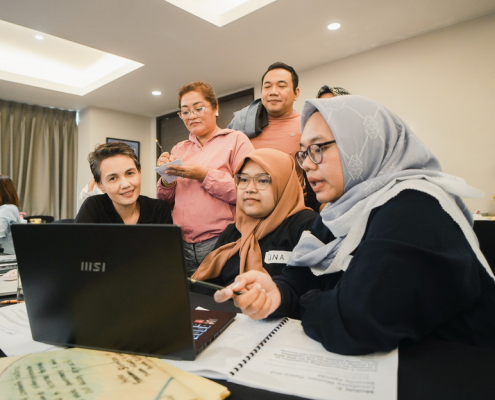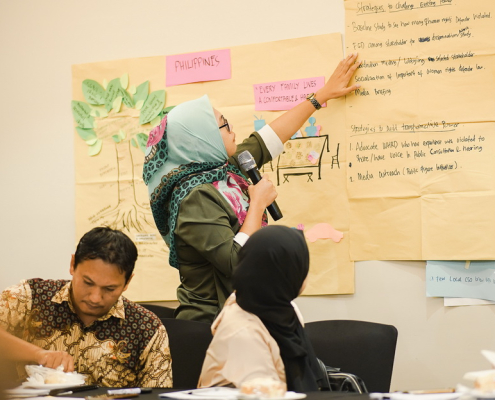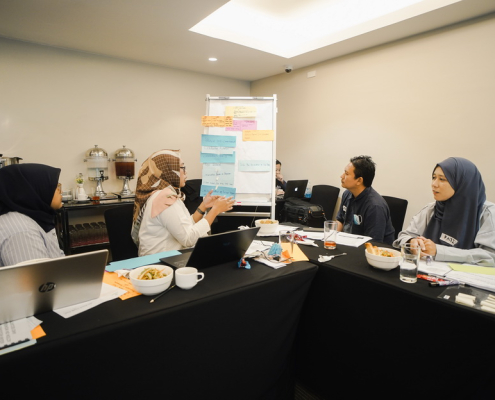The biggest motivation to be a companion is the human factor. Whatever the mistake, when they need help, they certainly have to be helped. Especially when they have realized their mistake and want to participate so that other people don’t experience what they feel. I mostly support women and children. You can imagine, when these mothers and children returned when their husbands became prisoners in prisons.
All problems rest on the shoulders of the wife when they really start things from scratch. Having no income, lost contact with family members, and must build a new life. Especially with children who have special needs, have health problems. Then what about the education of the children and their future. If no one accompanies and accompanies, what happens ??
In my opinion, providing assistance is a joint effort and process. How to understand the problems faced, see the needs and develop their potential so that in the future it can be better. To do all this, the first thing to do is build trust so that the process goes well.
As a process, of course there are ups and downs. Sometimes easy sometimes difficult. The most difficult thing is when helping to make ends meet, while the problems they face are many. Meanwhile, it is impossible for a companion or an institution to solve all problems without the help of other institutions.
For this reason, it is very important to build networks with many parties, for example with health institutions, educational institutions, social services, Disdukcapil, Vocational Training Centers, non-government organizations and others. There are times when an institution is easily invited to cooperate. But some are difficult and cannot. So have to keep looking. Besides that, another challenge is to build their mental and self-confidence. Because it is very difficult to return to activities in a society with a bad stigma as a terrorist. As a companion, it is not uncommon for them to receive bad treatment from the general public. Why would you want to work with people who have betrayed the state or are considered part of them (terrorists).
The bad treatment did not only come from the community or family, but also from the beneficiaries (deportants / returni) themselves. Refusal to be accompanied because they don’t have a problem. There are times when when they are visited, it turns out that they no longer live at that address or have moved house without giving their new address. This is often faced and makes assistants have to keep looking for gaps in order to enter, for example through the wife of a deportant / returni or a local RT. However, it must be done carefully so as not to cause new problems. For example, it makes people afraid because there are former deportants / returners in their area.
Deportants / returni who have received assistance are expected to change their ideology and truly love NKRI. The changes can be seen when they begin to communicate casually, talk heart to heart. When they began to be able to tell about the background of his “migration” to Syria. They also tell stories of regret and realize that what they have been thinking so far is wrong. They want to improve. We continue to exchange ideas as friends.
Through the mentoring process I studied at a university of life. Meet lots of people and learn each character. Seeing that every human being must have problems and need to fight for his life. Never give up and always be grateful. If you try there is always a solution. This changed my life. I can live a calmer and less demanding life. More respect for other people because in my job I need help from others.
During this process, of course I made mistakes. And my biggest mistake was to go too deep and intervene directly in the problems my people were facing. Actually, it is beyond my responsibility. This made my people dependent on me and turned off their creativity. I myself couldn’t eat and couldn’t sleep. Bring their problems in my family life. Husband and children were targeted. Now I have positioned myself as a companion and as a helpful friend. Not as an angel who can solve every problem.
Am I sure they (deportants / returni) whom I have assisted do not return to radical groups? There are honestly no guarantees. Even when you have signed a document of loyalty to the Republic of Indonesia, you cannot guarantee it. Many things affect. However, their involvement in program activities and conversations or chatting during the mentoring process can help the disengagement process (release) of radical groups.
Whatever I have done in this work, there is always a lesson to be learned. I realize that change is a long process. The mentoring process cannot be limited by the time the program runs. Assistance is also part of the humanizing process. Because every human being must have positive and negative sides. The key to the success of the mentoring process is the skill to empathize with our assistance.
Depok, 18 June 2020


 This workshop consisted of two sessions and was facilitated by Maricel Aguilar. The first session discussed ‘Introduction to Gender and Peace’ which included issues of gender and sex dichotomy, protection against gender-based discrimination and violence, and human security. Then, the second session talked about ‘Gender Issues and The Role of Social Institutions’ and its relation to the impact of a gender perspective in social institutions. It contains how the dimensions of gender, issues of patriarchy and transformative masculinity affect interpersonal, internal, institutional and ideological. The online workshop session was closed with a discussion on women’s rights and gender equality in Southeast Asia and the role of the government in each country in responding to this issue.
This workshop consisted of two sessions and was facilitated by Maricel Aguilar. The first session discussed ‘Introduction to Gender and Peace’ which included issues of gender and sex dichotomy, protection against gender-based discrimination and violence, and human security. Then, the second session talked about ‘Gender Issues and The Role of Social Institutions’ and its relation to the impact of a gender perspective in social institutions. It contains how the dimensions of gender, issues of patriarchy and transformative masculinity affect interpersonal, internal, institutional and ideological. The online workshop session was closed with a discussion on women’s rights and gender equality in Southeast Asia and the role of the government in each country in responding to this issue. From these activities, the participants were able to map the challenges, opportunities and implementation of women’s issues and peace. Apart from that, it also discussed the efforts of each country to advocate for gender issues in peace building. Pipit also stated that from this workshop, he could increase his knowledge of the International Legal Framework (UNSC 1325) and the Regional Framework (ASEAN RAP on WPS) and reflect on the current legal framework in Indonesia.
From these activities, the participants were able to map the challenges, opportunities and implementation of women’s issues and peace. Apart from that, it also discussed the efforts of each country to advocate for gender issues in peace building. Pipit also stated that from this workshop, he could increase his knowledge of the International Legal Framework (UNSC 1325) and the Regional Framework (ASEAN RAP on WPS) and reflect on the current legal framework in Indonesia. EMPATIKU works to innovate learning processes and transform institutional systems to foster people’s emotional competence and instill empathy.
EMPATIKU works to innovate learning processes and transform institutional systems to foster people’s emotional competence and instill empathy.